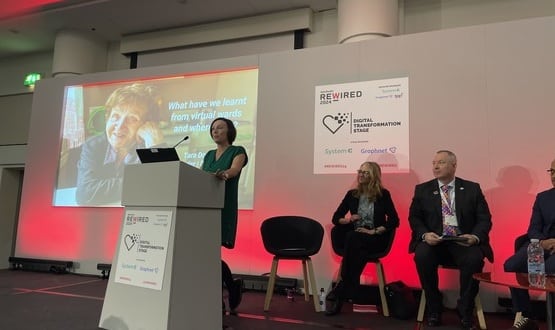The clinical and cost benefits of virtual wards are becoming clearer, but some clinicians still need to be won over to a model of care which should never be imposed, according to speakers at Rewired24 in Birmingham.
Digital Care founder Tara Donnelly said resistance to virtual wards was “always” about clinicians needing “reassurance that these care pathways are safe”.
“Let clinicians have a play with the kit and start to think about which patients would benefit,” she said. “The way not to do it, is to do it as a three-line whip. Test it and then build improvements. Some [formerly sceptical] clinicians become the strongest evangelists. When people see the benefits they become strongly converted.”
The general feeling among carers with experience of virtual wards is “very pleasantly impressed” said Donnelly. “But it’s an offer – it should never be mandated.”
The challenge for tech manufacturers, she added, “is making this as easy as using a mobile phone”.
Donnelly said there was “loads more work” to be done around tech-enabled care, a point also emphasised by Amanda Begley, executive director of digital transformation, Health Innovation Network. “Only 30% of virtual wards are tech-enabled. 24-hour monitoring is challenging,” said Begley.
Begley said evaluations of virtual wards had found evidence of clinical benefits and return on investment: patients were five times less likely to acquire an infection on virtual wards, and for every £1 invested there was a £2.80 saving.
However, she emphasised that the picture was “complicated and evolving” with work going on across London to address key areas, including building awareness and confidence in virtual wards and increasing the level of acuity that can be supported by the wards. There is a need to “do more in the ‘step up’ space and show the impact of virtual wards on hospital admission and length of stay,” she added.
While patients and carers are generally very positive about virtual wards, more work needs to be done to address health inequalities and the barriers that can restrict participation, agreed the panel. “We need to be thinking about carers… [some] people are worried about the costs of bringing technology into their home,” said Begley.
Contrary to some expectations, older people aged 65 and over are “most keen” on virtual wards, said Donnelly.
A new development, she said, was the potential to use remote monitoring to help reduce the elective care backlog: “If somebody isn’t a candidate for surgery you don’t want to find out on the day [of the operation]. Find out five days before and you can get someone else into the slot.”
Digital Health Rewired is taking place at the NEC in Birmingham 12-13 March. The programme is available here.

